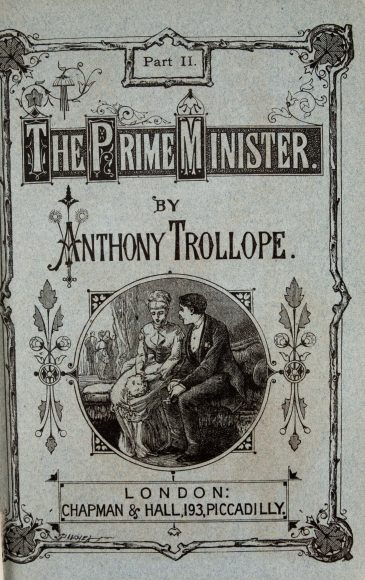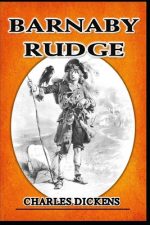February 6, 2024
For our last dally (for now, at least) into Anthony Trollope’s novel The Prime Minister, we’re ending with two of the (in my opinion, ‘natch) great characters in Trollope’s oeuvre, and perhaps in English fiction itself, Plantagenet Palliser and Glencora Palliser, his wife (Lord and Lady and then Duke and Duchess if you’re feeling formal). Their marriage and early days kick off the whole Palliser series of novels, and they surface here and there throughout the series, sometimes as bit parts, sometimes more supporting, sometimes starring. Which means it’s only fitting we end with a little brandy banter between them (don’t, of course, miss the earlier The Prime Minister Cocktail Talks, part I, part II, and part III, to learn more about the book, and for that matter, why not spend some with all the Anthony Trollope Cocktail Talks – you’ll have fun. Promise)!
“If you ask me, Plantagenet, you know I shall tell the truth.”
“Then tell the truth.”
“After drinking brandy so long I hardly think that 12s. claret will agree with my stomach. You ask for the truth, and there it is,—very plainly.”
“Plain enough!”
“You asked, you know.”
“And I am glad to have been told, even though that which you tell me is not pleasant hearing. When a man has been drinking too much brandy, it may be well that he should be put on a course of 12s. claret.”
“He won’t like it; and then,—it’s kill or cure.”
–Anthony Trollope, The Prime Minister
Tags: After drinking brandy so long I hardly think that 12s. claret will agree with my stomach, Anthony Trollope, Brandy, Claret, Cocktail Talk, Part IV, The Prime Minister, Trollope
Posted in: Anthony Trollope, Brandy, Cocktail Talk, Wine
November 14, 2023
For our fourth (but not our last!) visit within the pages of the Charles Dickens delight, the criminally under-read Barnaby Rudge, we get a view into some family relations, here between the, I’d say, villain of the piece, or one of such (perhaps the most villainous, though also well admired by many), and his son – who is, by curious ways and means, one of the heroes of the piece. While Mr. Chester, the father, may not be one who induces admiration within a reader (or not many of such), you can’t fault him for his views on wine in the below. Which goes to show that few are totally irredeemable. One hopes at least. Avoid being such yourself by reading the Barnaby Rudge Cocktail Talks Part I, Part II, and Part III (and really, checking out all the Charles Dickens Cocktail Talks will probably make you heroic, too).
“My dear Edward,” said Mr. Chester at length, with a most engaging laugh, “do not extend your drowsy influence to the decanter. Suffer that to circulate, let your spirits be never so stagnant.”
Edward begged his pardon, passed it, and relapsed into his former state.
“You do wrong not to fill your glass,” said Mr. Chester, holding up his own before the light. “Wine in moderation — not in excess, for that makes men ugly — has a thousand pleasant influences. It brightens the eye, improves the voice, imparts a new vivacity to one’s thoughts and conversation: you should try it, Ned.”
“Ah, father!” cried his son, “if —”
“My good fellow,” interposed the parent hastily, as he set down his glass, and raised his eyebrows with a startled and horrified expression, “for Heaven’s sake don’t call me by that obsolete and ancient name. Have some regard for delicacy. Am I grey, or wrinkled, do I go on crutches, have I lost my teeth, that you adopt such a mode of address? Good God, how very coarse!”
–Charles Dickens, Barnaby Rudge
September 19, 2023
Out final Vanity Fair Cocktail Talk, before we leave the legendary Thackeray (at least until I re-read or read another book of his!) in whatever afterlife bar he’s hanging out in today. But before leaving him and the book, we’re going to go along with one of the book’s large cast of characters for what I can only call a mighty mighty impressive day of drinking and eating. It’s, well, legendary (as are the Vanity Fair Cocktail Talks Part I, Part II, and Part III, which you should read).
Having partaken of a copious breakfast, with fish, and rice, and hard eggs, at Southampton, he had so far rallied at Winchester as to think a glass of sherry necessary. At Alton he stepped out of the carriage at his servant’s request and imbibed some of the ale for which the place is famous. At Farnham he stopped to view the Bishop’s Castle and to partake of a light dinner of stewed eels, veal cutlets, and French beans, with a bottle of claret. He was cold over Bagshot Heath, where the native chattered more and more, and Jos Sahib took some brandy-and-water; in fact, when he drove into town he was as full of wine, beer, meat, pickles, cherry-brandy, and tobacco as the steward’s cabin of a steam-packet.
— William Thackeray, Vanity Fair
Tags: ale, Brandy, brandy and water, cherry brandy, Claret, Cocktail Talk, Part IV, sherry, Vanity Fair, William Makepeace Thackeray
Posted in: beer, Brandy, Cocktail Talk, Wine
December 13, 2022
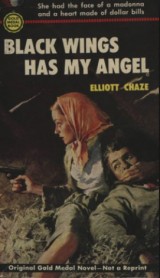 It wasn’t that long ago (weirdly, it was like five-and-a-half years ago, so maybe long ago in some ways? Your call) that I had a series of Cocktail Talks from the Elliott Chaze book Black Wings Has My Angel (read Part I, Part II, and Part III to learn more, see more, drink more). And today, when I woke with the desire to re-read the book (as one does with good books), and then began reading, I was again mystified that the book isn’t better know. Perhaps it’s better known now than five years ago, as another reprint in English has come out – for a long time, too long, the only recent versions were in French. It’s such a classic literary noir novel, and so well-written, it baffles me. Possibly it’s because he didn’t write a lot of books, period, and definitely that I know of, not another in this vein at this level. I’m still trying to track down other books by him, so might be wrong-footing that. But he wasn’t prolific as, say, Jim Thompson or David Goodis (who he shares some commonalities with, in this book if not others I’ve yet to read) in the novel knocking out department, and wasn’t a pulp mag story filler like Day Keene, having I’m guessing higher aspirations, and also a day job as a newspaper person. Maybe it’s that lighter output, but heck, maybe it’s just fate. Whatever, if you lean noir-y, and haven’t read this, you should. There’s more about the book in those old posts, but short story: criminal, femme fatale (both mains carrying layers), crime (with a murder, cold-blooded), the high-life, the lam-life, and bleak moments, written incredibly well. And booze. Especially I.W. Harper whiskey, which you could sip while reading. Enough of it that when I decided to have one more Cocktail Talk from the book, well, I.W. had to be a highlight.
It wasn’t that long ago (weirdly, it was like five-and-a-half years ago, so maybe long ago in some ways? Your call) that I had a series of Cocktail Talks from the Elliott Chaze book Black Wings Has My Angel (read Part I, Part II, and Part III to learn more, see more, drink more). And today, when I woke with the desire to re-read the book (as one does with good books), and then began reading, I was again mystified that the book isn’t better know. Perhaps it’s better known now than five years ago, as another reprint in English has come out – for a long time, too long, the only recent versions were in French. It’s such a classic literary noir novel, and so well-written, it baffles me. Possibly it’s because he didn’t write a lot of books, period, and definitely that I know of, not another in this vein at this level. I’m still trying to track down other books by him, so might be wrong-footing that. But he wasn’t prolific as, say, Jim Thompson or David Goodis (who he shares some commonalities with, in this book if not others I’ve yet to read) in the novel knocking out department, and wasn’t a pulp mag story filler like Day Keene, having I’m guessing higher aspirations, and also a day job as a newspaper person. Maybe it’s that lighter output, but heck, maybe it’s just fate. Whatever, if you lean noir-y, and haven’t read this, you should. There’s more about the book in those old posts, but short story: criminal, femme fatale (both mains carrying layers), crime (with a murder, cold-blooded), the high-life, the lam-life, and bleak moments, written incredibly well. And booze. Especially I.W. Harper whiskey, which you could sip while reading. Enough of it that when I decided to have one more Cocktail Talk from the book, well, I.W. had to be a highlight.
The bartender wore a phony gay-nineties mustache and a checked vest, and he was drunk enough himself to slosh the stuff around generously. Two I. W. Harpers painted the room prettily. I got a kick out of being in a crowd of people who were out to enjoy themselves. There were pictures over the bar of John K. Sullivan and of Gentleman Jim Corbett both stripped to the waist and wearing the kind of pants you see on tightwire performers and ballet dancers.
–Elliott Chaze, Black Wings Has My Angel
November 2, 2021
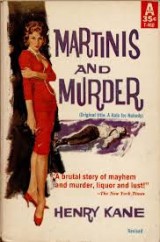 Way back now, oh, 6 years ago (wowza, times flies) or thereabouts I first read the Henry Kane pulper Martinis and Murder, starring detective, drinker, dancer (well, probably), romancer (certainly), and puncher Peter Chambers. And had a number of Cocktail Talks from it (check out Martinis and Murder Part I, Part II, and Part III to get caught up a bit). But recently I was hankering for some pocket-sized pulp reading, as I often am, and was pulled in by its catchy title and even-more-catchy cover, so re-read it. And, you know what? I found even more Cocktail Talk worthy quotes. The book is spilling boozy goodness (around some murdering and mystery-ing and hard-boiled action and smooching and such). Heck, in six years from now, I’ll probably read it again, and find even more potable quotables. But for today, let’s go with the below.
Way back now, oh, 6 years ago (wowza, times flies) or thereabouts I first read the Henry Kane pulper Martinis and Murder, starring detective, drinker, dancer (well, probably), romancer (certainly), and puncher Peter Chambers. And had a number of Cocktail Talks from it (check out Martinis and Murder Part I, Part II, and Part III to get caught up a bit). But recently I was hankering for some pocket-sized pulp reading, as I often am, and was pulled in by its catchy title and even-more-catchy cover, so re-read it. And, you know what? I found even more Cocktail Talk worthy quotes. The book is spilling boozy goodness (around some murdering and mystery-ing and hard-boiled action and smooching and such). Heck, in six years from now, I’ll probably read it again, and find even more potable quotables. But for today, let’s go with the below.
I came back and I asked, “How about some of the finest Sidecars ever concocted?”
“If you let me watch.”
“Why not?”
She trailed behind me. I turned and pushed her against the wall of the kitchen and kissed her hard.
“That for inspiration? she gasped.
“That’s for nothing,” I said.
I went to work with lemons and Cointreau and Cognac.
We brought the mixer into the living room, and in no time at all, fleece gathered.
–Henry Kane, Martinis and Murder
August 17, 2021
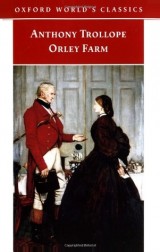 You may have thought it couldn’t be done, but we’re back to Orley Farm after our cinematic sidestep last week, and I’m going to have one more Mr. Moulder Cocktail Talk from the Trollope novel (I may have more Cocktail Talks from the book that don’t feature him, too. Only time will tell pals, and even it might not know!). But we’ve had a few of him in his higher moments, and so I only felt it was right to have one when he’s snoozing away after a long day shilling for Hubbles and Grease and swilling brandy and water (and perhaps other potent potables, too). However, it’s the description of his waking in the below quote that does the most for me. Oh, before I forget! Don’t miss the Orley Farm Cocktail Talks Part I, Part II, and Part III for more about the book itself, and all the Anthony Trollope Cocktail Talks (there are a few!) for more Trollopean fun.
You may have thought it couldn’t be done, but we’re back to Orley Farm after our cinematic sidestep last week, and I’m going to have one more Mr. Moulder Cocktail Talk from the Trollope novel (I may have more Cocktail Talks from the book that don’t feature him, too. Only time will tell pals, and even it might not know!). But we’ve had a few of him in his higher moments, and so I only felt it was right to have one when he’s snoozing away after a long day shilling for Hubbles and Grease and swilling brandy and water (and perhaps other potent potables, too). However, it’s the description of his waking in the below quote that does the most for me. Oh, before I forget! Don’t miss the Orley Farm Cocktail Talks Part I, Part II, and Part III for more about the book itself, and all the Anthony Trollope Cocktail Talks (there are a few!) for more Trollopean fun.
Soon after that Mr. Kenneby saw Mrs. Smiley home in a cab, and poor Mrs. Moulder sat by her lord till he roused himself from his sleep. Let us hope that her troubles with him were as little vexatious as possible; and console ourselves with the reflection that at twelve o’clock the next morning, after the second bottle of soda and brandy, he was ‘as sweet as sweet.’
–Anthony Trollope, Orley Farm
March 9, 2021
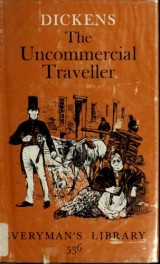 While this isn’t going to turn into The Uncommercial Traveller blog – though that wouldn’t be a horrible idea, honestly – we do have a few more stops with the wandering Charles Dickens, as he wanders through London and the UK and other parts and places as well, writing essays along the way. Today, we’re taking a journey with him to the essay called “An Old Stage-Coaching House,” where he visits a bar and town that used to be a stop for stage coaches, when such ran, before the trains took the wind out of the stage coach business, leaving towns fading behind (as in some ways the highways did to a lot of train towns). Our actual Cocktail Talk is from the owner of the Dolphin (the inn mentioned above), who still wants to give the Traveller a good meal, even if there are no stages running. Oh, don’t miss The Uncommercial Traveller Cocktail Talks Part I, Part II, and Part III, for more about the book, and all the Dickens Cocktail Talks for more good Dickens quotes.
While this isn’t going to turn into The Uncommercial Traveller blog – though that wouldn’t be a horrible idea, honestly – we do have a few more stops with the wandering Charles Dickens, as he wanders through London and the UK and other parts and places as well, writing essays along the way. Today, we’re taking a journey with him to the essay called “An Old Stage-Coaching House,” where he visits a bar and town that used to be a stop for stage coaches, when such ran, before the trains took the wind out of the stage coach business, leaving towns fading behind (as in some ways the highways did to a lot of train towns). Our actual Cocktail Talk is from the owner of the Dolphin (the inn mentioned above), who still wants to give the Traveller a good meal, even if there are no stages running. Oh, don’t miss The Uncommercial Traveller Cocktail Talks Part I, Part II, and Part III, for more about the book, and all the Dickens Cocktail Talks for more good Dickens quotes.
‘If I couldn’t give you a pint of good wine, I’d—there!—I’d take and drown myself in a pail. But I was deceived when I bought this business, and the stock was higgledy-piggledy, and I haven’t yet tasted my way quite through it with a view to sorting it. Therefore, if you order one kind and get another, change till it comes right. For what,’ said Mellows, unloading his hat as before, ‘what would you or any gentleman do, if you ordered one kind of wine and was required to drink another? Why, you’d (and naturally and properly, having the feelings of a gentleman), you’d take and drown yourself in a pail!’
–Charles Dickens, The Uncommercial Traveller
January 26, 2021
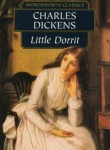 Well, it’s sad day in a way (a small sadness), as we’re at the last of our cocktail talks from the Dickens classic Little Dorrit. It’s funny to phrase it as such, “Dickens classic” that is, being that I think all Dickens books are classics. We could go on about that, but I don’t want to get in the way of our final quote any more than to say, be sure that you don’t miss Little Dorrit Cocktail Talks Part I, Part II, and Part III, as well as reading all past Charles Dickens Cocktail Talks – but maybe read the below from Little Dorrit first. In it, we return to one of my favorite characters in the book, Flora, who may be the most digression-filled character in all of Dickens, which is saying something, as he liked to tangent in perhaps the best way yet in Western Lit. If she’s not, she’s up there! And, she likes a little tipple, too, which the below has, if not much of the digressionary tactics you sometimes get with Flora. But a good way to end our tipsy tour through Little Dorrit, which I’ve certainly enjoyed!
Well, it’s sad day in a way (a small sadness), as we’re at the last of our cocktail talks from the Dickens classic Little Dorrit. It’s funny to phrase it as such, “Dickens classic” that is, being that I think all Dickens books are classics. We could go on about that, but I don’t want to get in the way of our final quote any more than to say, be sure that you don’t miss Little Dorrit Cocktail Talks Part I, Part II, and Part III, as well as reading all past Charles Dickens Cocktail Talks – but maybe read the below from Little Dorrit first. In it, we return to one of my favorite characters in the book, Flora, who may be the most digression-filled character in all of Dickens, which is saying something, as he liked to tangent in perhaps the best way yet in Western Lit. If she’s not, she’s up there! And, she likes a little tipple, too, which the below has, if not much of the digressionary tactics you sometimes get with Flora. But a good way to end our tipsy tour through Little Dorrit, which I’ve certainly enjoyed!
‘You see, my dear,’ said Flora, measuring out a spoonful or two of some brown liquid that smelt like brandy, and putting it into her tea, ‘I am obliged to be careful to follow the directions of my medical man though the flavour is anything but agreeable being a poor creature and it may be have never recovered the shock received in youth from too much giving way to crying in the next room when separated from Arthur, have you known him long?’
— Charles Dickens, Little Dorrit
